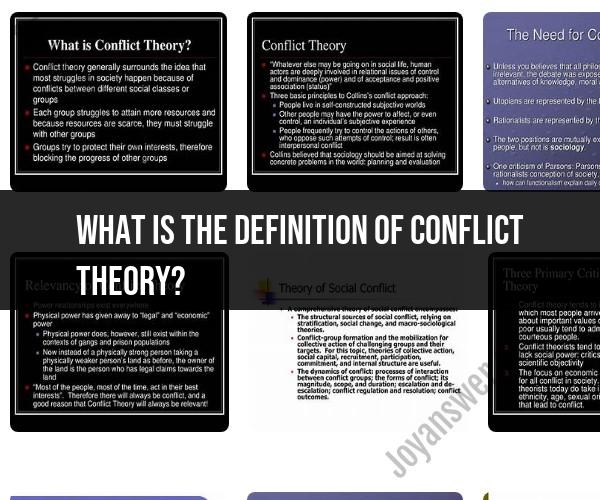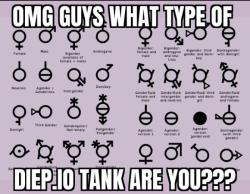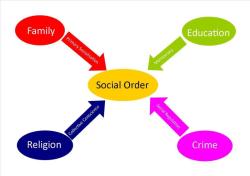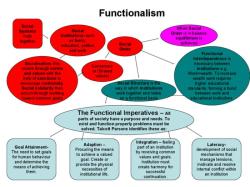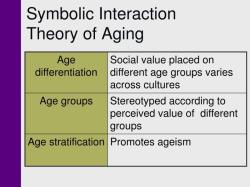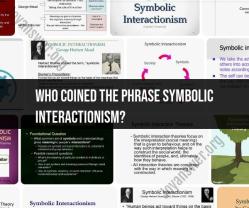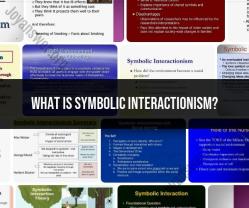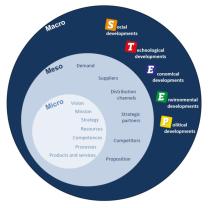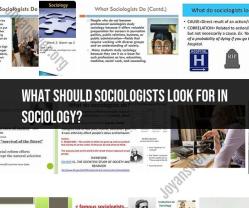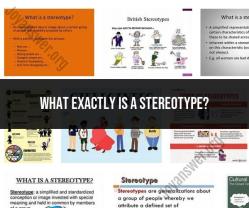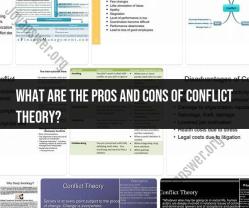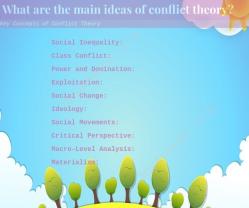What is the definition of conflict theory?
Conflict theory is a sociological perspective that views society as a system characterized by various inequalities and conflicts over limited resources and power. It focuses on the underlying tensions, disparities, and struggles that exist within society and how these factors shape social structures, institutions, and individuals' behavior. Conflict theory is one of the major theoretical frameworks in sociology and is often used to analyze issues related to class, race, gender, and other forms of social inequality.
Key components of conflict theory include:
Inequality: Conflict theory emphasizes the existence of social and economic inequalities. It argues that societies are divided into different groups or classes with varying access to resources, opportunities, and power. These inequalities can lead to competition and conflict among these groups.
Power Struggles: Conflict theory recognizes that those who hold positions of power and authority often use their influence to maintain their status and protect their interests. This power struggle can lead to social conflict and tension between different groups.
Social Change: Conflict theory sees social change as a result of conflict and tension between different groups. When one group seeks to challenge or change the existing social order, it can lead to changes in laws, policies, and social structures.
Marxist Roots: Conflict theory has its roots in the ideas of Karl Marx, who argued that the primary source of conflict in society is the struggle between the working class (proletariat) and the owning class (bourgeoisie) over control of resources and the means of production.
Critical Perspective: Conflict theory takes a critical and often revolutionary perspective, advocating for the transformation of society to reduce inequality and create a more equitable social order.
Social Movements: Social movements and activism are often seen as tools for challenging the existing power structures and advocating for change. Conflict theory is often associated with the analysis of social movements and their impact on society.
It's important to note that conflict theory is just one of several sociological perspectives used to understand society. Other perspectives, such as functionalism and symbolic interactionism, offer different lenses through which sociologists analyze social phenomena. Conflict theory is particularly useful for examining issues related to social injustice, inequality, and the impact of power dynamics on societal structures and individuals.
Defining Conflict Theory: An Overview of a Sociological Perspective
Conflict theory is a sociological perspective that views society as being in a constant state of conflict due to the unequal distribution of power and resources. Conflict theorists argue that this conflict is the driving force of social change.
Conflict theory is one of the three major sociological perspectives, along with functionalism and symbolic interactionism. It is a macro-level theory, meaning that it focuses on large-scale social structures and institutions, such as class, gender, and race.
The Fundamental Premises and Principles of Conflict Theory
The fundamental premises and principles of conflict theory include:
- Society is in a constant state of conflict. This conflict is due to the unequal distribution of power and resources.
- Conflict is the driving force of social change. Conflict leads to social change because it forces people to address the underlying causes of the conflict.
- Power and resources are distributed unequally in society. This unequal distribution leads to conflict between different groups of people.
- The dominant group in society maintains its power and privilege by exploiting and oppressing other groups. The dominant group uses its power to create and enforce laws and policies that favor its own interests.
- Social change is possible through conflict and resistance. When oppressed groups come together to challenge the dominant group, they can create social change.
Theoretical Frameworks and Schools of Thought in Conflict Theory
There are a number of different theoretical frameworks and schools of thought within conflict theory. Some of the most notable include:
- Marxist conflict theory: Marxist conflict theory is based on the ideas of Karl Marx and Friedrich Engels. Marxists argue that the fundamental conflict in society is between the bourgeoisie (the owners of the means of production) and the proletariat (the working class).
- Feminist conflict theory: Feminist conflict theory examines the conflict between men and women in society. Feminist conflict theorists argue that men hold power and privilege over women, and that this unequal distribution of power leads to conflict.
- Racial conflict theory: Racial conflict theory examines the conflict between different racial groups in society. Racial conflict theorists argue that racism is a system of oppression that maintains the power and privilege of white people.
Conflict Theory's Application in Analyzing Social Phenomena
Conflict theory can be used to analyze a wide range of social phenomena, including:
- Social class: Conflict theorists argue that social class is the most important factor in determining social conflict and change.
- Gender: Conflict theorists argue that gender is another important factor in determining social conflict and change.
- Race: Conflict theorists argue that race is also an important factor in determining social conflict and change.
- War and peace: Conflict theorists argue that war and peace are the result of social conflict.
- Crime and deviance: Conflict theorists argue that crime and deviance are the result of social conflict.
- Social movements: Conflict theorists argue that social movements are a way for oppressed groups to challenge the dominant group and create social change.
Contemporary Debates and Evolutions in Conflict Theory
Conflict theory is a dynamic and evolving field of study. Contemporary debates and evolutions in conflict theory include:
- The role of culture in social conflict: Conflict theorists are increasingly interested in the role of culture in social conflict. For example, some conflict theorists are examining the role of religion in social conflict.
- The role of technology in social conflict: Conflict theorists are also interested in the role of technology in social conflict. For example, some conflict theorists are examining the use of social media in social movements.
- The globalization of conflict: Conflict theorists are also interested in the globalization of conflict. For example, some conflict theorists are examining the role of multinational corporations in social conflict.
Conflict theory is a valuable tool for understanding the social world. It helps us to understand the root causes of social conflict and change. It also helps us to understand the ways in which power and resources are distributed in society.
